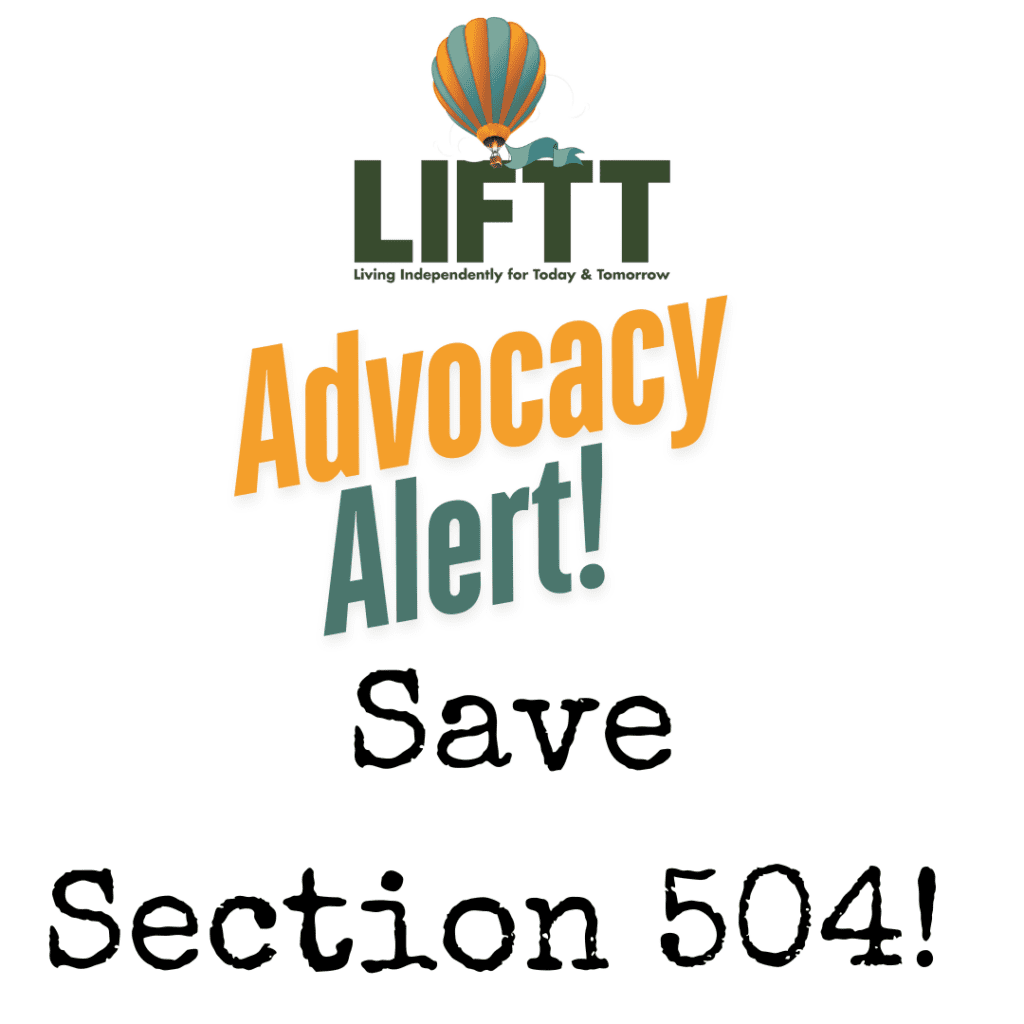
Make no mistake: Texas v. Becerra is not about “government overreach.” It is about power — the power to decide who gets to participate in society and who does not.”
LIFTT Executive Director Carlos Ramalho
Montana’s Attorney General Austin Knudsen has joined 16 other state AGs in a lawsuit ( Texas v. Bercerra) challenging the constitutionality of Section 504 of the Rehabilitation Act.
Section 504 predates the Americans with Disabilities Act and is the basis for civil rights protections and reasonable accommodations for people with disabilities’ participation in education, health care, and any other program or service that receives federal funding.
As LIFTT Executive Director Carlos Ramalho said in his recent “Call to Action to Defend Section 504”, the stakes could not be higher if this lawsuit succeeds:
“For more than 50 years, Section 504 has been the cornerstone of disability rights in America. It was the first federal law to prohibit discrimination against people with disabilities, the foundation upon which the Americans with Disabilities Act (ADA) was built. It is the reason that:
- Students with disabilities receive accommodations in public schools.
- Disabled veterans cannot be denied federal employment.
- Hospitals and clinics must provide accessible medical care.
- Public transportation must be accessible to all.
And let us not forget what life looked like before Section 504. If you had a disability, you were not protected. You were not included. You were not seen. You could be denied education, turned away from jobs, left without medical care, and institutionalized against your will.
That was not ancient history. That was America — just 50 years ago. And if the plaintiffs in Texas v. Becerra have their way, we will return to that world.
Make no mistake: Texas v. Becerra is not about “government overreach.” It is about power — the power to decide who gets to participate in society and who does not.
Montana and 16 other states claim they are not trying to eliminate Section 504, just to limit its enforcement. But let’s call this what it is: a deliberate attempt to erode protections until they are meaningless.
The plaintiffs argue that requiring states to provide services in the “most integrated setting” possible is an undue burden. In other words, they want the power to institutionalize people with disabilities rather than provide them with the resources they need to live independently.
They argue that states should not be held accountable if their policies put people at “serious risk of institutionalization.” In other words, they want to cut services without consequence, even if it forces people into nursing homes or segregated facilities against their will.
They argue that the federal government has no right to set conditions on how states use federal disability funding. But let’s be clear: you cannot take the money and reject the responsibility.
If this lawsuit succeeds, it will not be politicians or bureaucrats who suffer. It will be:
- The child with cerebral palsy who is told her school is no longer required to accommodate her.
- The veteran with a spinal cord injury who finds that his healthcare options have suddenly narrowed.
- The Montana senior with mobility impairments who is forced into an institution because home-based services were quietly defunded.
- The young professional with vision loss who is denied a job because her employer no longer fears legal consequences.
This is not theoretical. This is what will happen.
We often hear the words, “All men are created equal.” But do we mean it? Does equality stop at the presence of a disability? Are we really willing to return to a society where disability rights are optional?”
Background on Texas v. Becera
LIFTT has prepared two documents to provide advocates and the public with more background on Texas v. Bercerra and the real possibilities for harm that exist should the plaintiff states get what they are asking for. Click on the links below to view them.
How Can I Take Action?
We need every Montanan, those with disabilities and those without, to contact Attorney General Austin Knudsen by phone, email, and even snail mail and ask him to stop attacking our rights guaranteed us by Section 504 and withdraw from this lawsuit!
How do I contact Attorney General Knudsen and tell him to stop attacking our rights?
There are several ways to voice your concerns to the Attorney General:
- Email: contactdoj@mt.gov
- Snail Mail: P.O. Box 201401, Helena, MT 59620-1401
- Phone: (406) 444-2026
- Web: Montana’s DOJ Website Contact Page
What do I write/say?
- Be respectful
- Say who you are. Say your name or the name of your group you represent. Say where you in Montana you live. If you want, you can say what your disability is.
- Say why you support Section 504 and its rules. Talk about why Section 504 is essential to you. Section 504 and its rules make sure people with disabilities can be included in schools, see their doctor, and have access to things like housing and transportation.
- Say why Texas v. Becerra is a threat to your civil rights. If the court agrees with the states bringing the lawsuit, people with disabilities will lose civil rights. These rights have protected people with disabilities for over 50 years.
- Include personal details. You can tell a personal story about why Section 504 matters to you. Some stories that might be helpful to include are:
- How you got an interpreter at a doctor’s appointment and could talk to your doctor.
- How a 504 Plan helped you be included in school as a child or young adult.
- How a 504 Plan allows your child to participate in school
- How did a reasonable accommodation help you gain or maintain employment
- How are your needs met in a community integrated setting instead of a nursing home or other institution
About Living Independently for Today & Tomorrow (LIFTT): LIFTT is a Montana 501(c)3 corporation organized as a Center for Independent Living (CIL). With team members based in Billings and Glendive, LIFTT provides aging and disabled members of the community with programs and services that help empower them to break down the physical, bureaucratic, and cultural barriers that prevent them from being fully independent participants in their lives and communities throughout 18 counties in southeastern and south-central Montana: Big Horn, Carbon, Carter, Custer, Dawson, Fallon, Garfield, Golden Valley, McCone, Musselshell, Powder River, Prairie, Richland, Rosebud, Stillwater, Treasure, Wibaux, and Yellowstone. For more information, please visit liftt.org or download our mobile app for your Apple or Android Device.

